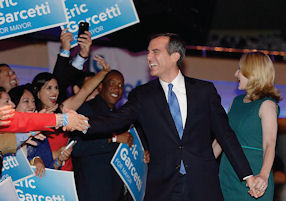In retrospect, of course, everything seems obvious. After all, why would anyone think that groveling for the endorsements of city unions would pay off in an era when the average family has trouble making ends meet, despite what is being labeled a recovery by economists? Sure, there was political calculation behind it: The power of L.A.’s unions to get out the vote would more than make up for the residents turned off by Wendy Greuel’s close association with Department of Water and Power workers. And for good measure, she brandished her endorsements from business groups, especially the Los Angeles Area Chamber of Commerce and Valley Industry and Commerce Association. But doesn’t it all show just how far unions have fallen in the eyes of voters that even in a Democratic city like Los Angeles such a close association turned into Greuel’s political kiss of death? And why would anyone believe otherwise. Debate what you want about the decline of the labor movement – go ahead, say Ronald Reagan put the nail in the coffin with his firing of striking air traffic controllers in 1981 – but the fact remains that with its last stronghold being government employees, the average worker feels alienated from organized labor. It’s perfectly reasonable to conclude labor is no longer out to help all workers but more interested in consolidating gains in City Hall, trading favors with entrenched politicians so municipal employees can guarantee themselves a handsome pension. Meanwhile, the rest of us fear retirement in a beat-up camper, roving from one U.S. Forest Service campsite to another, lest we overstay our 30-day limit. Trust me. I love to take my kid camping and there are plenty of folks just like that. But, as I said, it only looks clear in retrospect, which raises the issue of the economic challenges facing incoming mayor Eric Garcetti. Sure, the campaign was a tough one, but now comes the harder part: running a world-class city handicapped by the limited executive powers in the city’s charter while facing the challenges of bloated pensions, crumbling infrastructure and a brutally uneven economic recovery. It’s been well documented that the current wave of the tech revolution has supercharged some neighborhoods, particularly those around Santa Monica and the beach, into some of the hottest spots on the planet. And that’s great if you’re a bright 21-year-old UCLA graduate with some technical degree, but what about the rest of us who don’t live on Silicon Beach? Garcetti has said improving the local economy is a top priority. But didn’t Mayor Antonio Villaraigosa think he could revive old industrial neighborhoods with new jobs in green tech – no make that clean tech, or whatever he called it? Talk about a major bust. For all the efforts to bring in new manufacturing one of his biggest accomplishments was attracting a startup electric car company called Coda Automotive with an $800,000 incentive package. Come to think of it, that’s kind of puny as an incentive but the results were even worse. This year, the company went belly up after selling something like 100 of its undesirable econoboxes. It would be too easy to make fun of the mayor, but he tried. And, hell, he was far from the only politician to put his faith in “green tech.” Even in China, the bottom is falling out of a once robust solar panel industry heavily supported by the central government. Which, once again, is to state the obvious: For L.A. to be the city we all want – a place with plenty of jobs paying living wages and vibrant neighborhoods well beyhond our wealthy communities – economic forces beyond anyone’s control would have to intervene. And clearly that’s well beyond the powers of the mayor. But I wish him well. Laurence Darmiento is editor of the Business Journal. He can be reached at [email protected].
